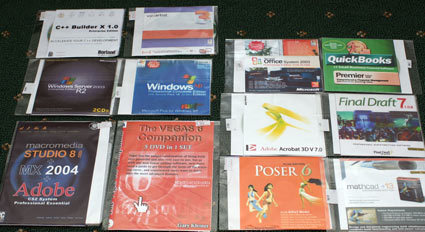TG Daily Report: Microsoft Office for $4
Bangkok (Thailand) - Glittering watches, silk ties and tailored suits are what you would expect to buy from a shopping center in Asia, but what about illegal software? While software pirates in the United States generally download their programs from peer-to-peer download sites, people in countries like China and Thailand can simply head to a nearby mall. Chances of criminal penalties for the buyers are slim.
In a recent trip to Bangkok Thailand, TG Daily had a chance to have a closer look at pirated versions of typically pricey applications such as Microsoft Windows XP, Office, Macromedia Studio. In Bangkok, such software is offered not just in some dark alleyway, but also in regular stores and trendy malls. Of course we were interested in what a few Dollars actually buy and picked up some programs at the Fortune Town Mall, Panthip Plaza and MBK Mall.
At all three locations the scene was the same: Two sided copies of the software manual or CD cover were displayed along with a three or four digit number. The front side indicated the program like Microsoft Office or Windows XP, while the reverse side displayed a serial number or instructions on how to generate the serial number. To purchase the software, we took the printouts to a clerk who then asked us to pay around the equivalent of $2 to $4 per CD. The clerk picked up the phone, relayed the numbers in Thai to the other side and then told us to wait a few minutes.
A runner arrived in just under ten minutes and handed the clerk a plastic bag that contained several CDs, still hot from the CD duplicator, and paper covers. After briefly checking the discs, the clerk handed us the software. The whole process from entering the store to receiving the software was just over ten minutes.
This form of "in your face" software piracy has been going on for decades in Asia. Drawing from a 2004 study, Neil MacBride, vice president of legal affairs at the Business Software Alliance said the entire Asia-Pacific region has a 53% piracy rate, which means every other software installation is a copy. But when you drill down into specific countries, the statistics are even more shocking, as MacBride told us that Thailand has a 79% piracy rate, while China has a 90% rate. In comparison, the United States has a 21% piracy rate, which MacBride says, "is relatively low compared to the rest of the world."
MacBride told us that people bringing the software into the United States will probably not face criminal penalties, but warned that the software could contain malware and transmit personal information to the Internet.
Buying the software is just half the story for tourists, because they have to get the software back into their home countries. You would think that Customs would stop and confiscate the software, but this did not happen in our case. On our United States Custom form, we listed every CD and how much we paid for it. At the Customs checkpoint at the Los Angeles International Airport, we were waved through even after showing the Customs officer the 20 disc CD case full of software. The officer said, "You can bring software for personal use, but if you have enough to sell that's when we stop you."
Get Tom's Hardware's best news and in-depth reviews, straight to your inbox.
Indeed, the officer was repeating policy that is spelled out in the US Customs and Border Protection publication, "Know Before You Go", which states a "personal use exemption" may be granted for a pirated articles which includes software, DVDs and traditional counterfeit goods like Rolex watches and Louis Vuitton handbags.
Jesse Feder, BSA's Director of International Trade and Intellectual Property, told us that importing any amount of pirated software, personal use or otherwise, is illegal, but adds, "we also recognize that Customs has a lot of priorities and put their efforts where it does the most good."
But what are the legal ramifications of installing and using the pirated software? While using pirated software could open you up to civil lawsuits from the affected software companies, there is very little the BSA can do against an individual. Feder said the chances of BSA going after consumer is small, adding, "consumers are not our primary source for enforcing copyright violations." The BSA has been quite successful in getting companies to pay tens of thousands, even hundreds of thousands of dollars to settle piracy claims.
The main problem for purchasers is not of legal nature, but rather technical problems that can occur from installing the software. MacBride warned that the lack of quality control could damage computers and valuable data after someone installs a pirated program. He compared illegal software vendors to drug dealers, whom he went after as a federal prosecutor before joining the BSA. MacBride said, "When I did drug cases there were people would buy a dime bag of heroin and it turned out to be flour. You don't know what's in it or what viruses it may contain."
While we haven't tested out all the software that we purchased, the several programs we have managed to play with worked like their legitimate versions. Viruses in fact are a potential threat, but at least in our case, we were not able to confirm a presence of any malware.
But in the long run, MacBride said the seemingly cheap software may not actually save you money, "You spend a lot of money to buy a desktop or laptop computer and you risk damaging that or losing an entire database for a piece of software bought out of a cart," he said.
Humphrey Cheung was a senior editor at Tom's Hardware, covering a range of topics on computing and consumer electronics. You can find more of his work in many major publications, including CNN and FOX, to name a few.
